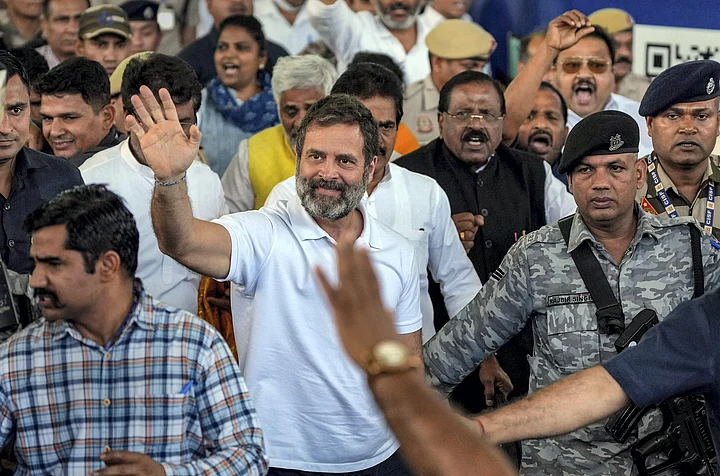"The punishment is undoubtedly harsh because of the consequences it has," former Supreme Court Justice Madan Lokur said, without going into the merits of the criminal defamation case in which Congress leader Rahul Gandhi has recently been convicted.
"The proportionality principle has been ignored," Justice Lokur added noting that Gandhi has been awarded the maximum sentence under the offence.
Rahul Gandhi's conviction has also led to his disqualification as a Lok Sabha member. We explain the reason and the law behind that in part one of this two-part analysis.
Meanwhile, commenting on Gandhi's conviction and disqualification, Supreme Court Advocate Shadan Farasat said:
“Rahul Gandhi’s disqualification is the consequence of application of a law to an inapplicable case."
How so?
According to Farasat, the reason is three-fold.
Reason 1: No Question of 'Class Defamation'
“Firstly there was no question of defamation itself, because it’s not individual defamation, they are claiming defamation of a class."Shadan Farasat, Supreme Court Advocate
It may additionally be pointed out that while section 499 IPC states that defamation charges can be brought by “a company or an association or collection of persons as such (Explanation 2),” it also says:
“No imputation is said to harm a person’s reputation, unless that imputation directly or indirectly, in the estimation of others, lowers the moral or intellectual character of that person, or lowers the character of that person in respect of his caste or of his calling, or lowers the credit of that person, or causes it to be believed that the body of that person is in a loathsome state, or in a state generally considered as disgraceful. (Explanation 4)”
Besides, Apar Gupta, executive director of the Internet Freedom Foundation told Scroll that there needs to be “a very high degree of certainty” that the individual claiming to have been defamed is being identified as a member of the group.
Pointing out that people having the same surname are, by their very nature, an indeterminate class, Gupta added: “A person will not make an association with the complainant (Purnesh Modi) based on Gandhi’s statement.”
Also did Rahul Gandhi — who ironically himself is often subjected to mockery and derogation by the ruling party and its followers — really lower the moral or intellectual character of all Modis, by that one offhanded remark? Did he lower their credit? Aren't the standards of free speech that apply to those who poke fun at Gandhi, applicable to him too?
Reason 2: 'Every Sun is A Star, But Not Every Star is a Sun'
"Technically also he has not said that 'all Modis are thieves'. He has asked: 'Why do all the thieves have Modi in their names?'. There’s a fundamental difference in that."Shadan Farasat, Supreme Court Advocate
"He hasn’t said anything against all Modis everywhere, he has taken three names — Nirav Modi, Lalit Modi and the Prime Minister's," Shadan Farasat added, asking:
"So what is the complainant Purnesh Modi’s grief?"
Senior Advocate Niya Ramakrishnan further told Scroll that Gandhi’s statement did not hurt all Modis “just as saying that all men are mortal is not the same as saying all mortals are men”.
Or, we may add: just as saying every sun is a star, is not the same as saying every star is a sun.
So, really what is Purnesh Modi’s grief? And if his grief isn’t made out, how does his case even stand legal scrutiny?
Under section 199(1) of the Criminal Procedure Code, the complainant has to be the person aggrieved by the alleged offence.
Reason 3: And Why Maximum Punishment?
How Rahul Gandhi was granted maximum-punishment despite being a first-time offender remains unclear, as well.
"Rahul Gandhi is a first time offender, and does not have any other prior convictions. As per the probation act and rules, you cannot give maximum punishment to a first time offender. How have you given him maximum punishment?"Shadan Farasat, Supreme Court Advocate
Farasat further noted that if the court had sentenced him to 1 year 11 months and 29 days in jail, his disqualification would not have come into effect.
"He had to be given two years (the maximum punishment under the offence) for the disqualification to apply. So prima facie it seems perverse," he added.
What About Free Speech And Democracy?
In 2020, the Madras High Court had quashed alleged cases of “criminal defamation against State (filed by the Public Prosecutor under 199(2) CrPC), and said:
"The criminal defamation law is meant for a laudable object in real cases of necessity and cannot be misused by using the State as a tool to settle scores of a public servant/constitutional functionary over his/her adversary...The state cannot use criminal defamation cases to throttle democracy.”
Besides isn't electoral banter always rife with chiacking and mutual mockery? While someone may have been called a thieving security-guard, wasn't someone else derided as Pappu, and yet another person, at some point, compared to Ravana's sister from Ramayana? If our leaders walked around filing (and winning!) cases at the slightest instance of jeering, then we would end up with more ministers in prison, than in the parliament. Besides, with all the incarcerated journalists and activists and protesters and political dissidents, I daresay our jails are already wanting for space.
On a serious note, though: who can really argue that we need a more restrictive approach to free speech? Not our top court, at least.
"(An) alleged criminal speech should be judged from the standards of reasonable, strong-minded, firm and courageous men, and not those of weak and vacillating minds, nor of those who scent danger in every hostile point of view.”Supreme Court, Ramesh Vs Union of India
(With inputs from The Leaflet, Scroll and Livelaw.)
